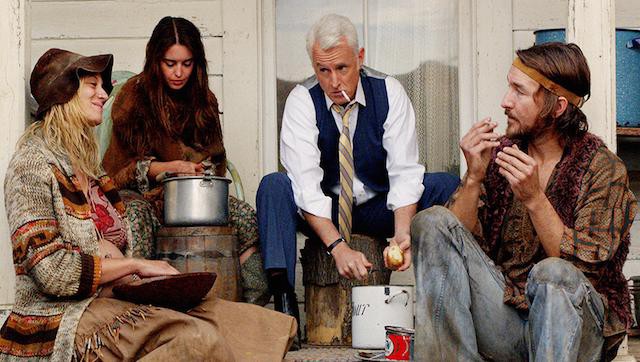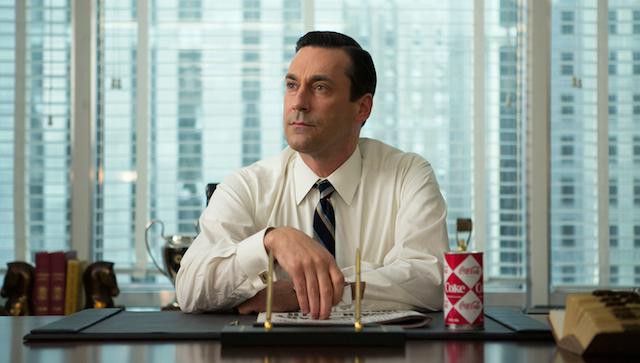Mad Men: In the Land of the Lost
by Jen Doll

One of the recurring themes in Mad Men involves lost children, children who have lost their parents, parents who have lost their kids. We see characters who were abandoned, orphaned, or simply didn’t get enough love (Don Draper included) who go on to pathologically treat their own offspring the own way, often without much awareness or self-reflection about doing so. Don was a lost kid who became a lost adult, though he’s kept it covered it up with bravado and a good sell over the years, albeit with a few cracks emerging.
This “lost” storyline goes well beyond Don, though. Pete lost his mother, in part because of Bob Benson. Roger’s lost baby with Joan is a little boy he’s not permitted to spend time with. Peggy’s lost child (with Pete) is out there somewhere in the world, though for now that fact is deeply suppressed from Peggy’s day-to-day consciousness. Betty once ventured to Greenwich Village in an attempt to retrieve Sally’s friend, lost on purpose and headed to California. Megan, now, is sort of lost in California. Earlier this season, Sally attended a funeral for a classmate’s mother, which brought to the forefront issues with her father, who she, too, sees at times as lost — a parallel to how she often feels herself. And in this episode, we find out that Roger’s daughter Margaret, now going by the name “Marigold,” has run off to live in a hippie commune in upstate New York, leaving behind her husband and another lost child, her four-year-old son.
The episode begins with Pete, at dinner with his real estate agent girlfriend Bonnie, who notices a man staring at her. It’s a connection from the past: George, who used to work with Pete’s father-in-law and is now scouting Disneyland for his client Burger Chef. There’s a pang when Pete learns his estranged father-in-law, who I believe he last ran into in a brothel, has had a heart attack, but this is swept away with the possibility of new work for the agency. Bonnie is complimentary: “I love watching you work,” she says, and Pete brushes it off, sort of uncharacteristically, perhaps thinking of Trudie.
Don is back at Sterling Cooper and he’s the odd man out. Meetings — including an office-wide gathering announcing a new computer that the agency has purchased (Harry Crane has finally had his day) — happen without him being informed. He’s been put in the office of a dead man, highlighting his diminished status at the firm. The installation of the new office computer brings a bunch of “men being replaced by machines” conversation, progress vs. posterity. “These machines can be a metaphor for whatever’s on people’s minds,” says the head computer guy. The creatives lose their lounge, and Ginsberg loses it and shouts, “They’re trying to erase us, but they can’t erase this couch,” which he tries to get Don to help him move. Don is ultimately disgusted by the display, and maybe overcome by all the symbolism of replacement, and returns to his office, where he loses a cigarette under a file cabinet and finds a New York Mets pennant, which he hangs on his wall. I had to research the importance of this Mets pennant, because obviously it’s symbolic. The Mets had never had a winning season until 1969, the year we’re living in on Mad Men, when they won the World Series. All is not necessarily lost.
Office controversy continues with Pete and Ted in conference with New York to decide who should wrangle the Burger Chef business. Peggy’s the first choice, Don comes up as an afterthought, and sadistic Lou takes it upon himself to give the work to Peggy, offering her a raise for it, so as to make her manage Don, too — and probably to humiliate him. (The computer-replaces-man storyline is subtext for the office maneuvering and politics and power plays that have been going on since the merger.) The office scenes at the agency have reached a whole new level of awkwardness, by the way, with Don and Peggy in offices right next to each other, separated by a thin wall, yet tiptoeing around each other. Peggy’s scared to confront Don, and Don’s unwilling to heed Peggy. When she asks him for work, putting him on par with a young creative, he refuses, but he keeps showing up at the office — to play cards, to lie on the couch and read Portnoy’s Complaint. On the other side of the wall, Peggy stews.

Roger’s ex-wife Mona and grandchild arrive at the office with Margaret’s husband Brooks; they bring the news that Margaret has run off and is now ensconced in some cult or commune. Mona wants Roger to get her back. The ever-incompetent Brooks goes instead and ends up arrested, so Roger and Mona venture out after their daughter, dressed in upper-crust attire, looking utterly out of place. They find her, but their shared perspectives are as far apart as their wardrobes. “These people are lost and on drugs and they have venereal diseases,” Mona tells her daughter, who’s dressed in rags and looking beatific, if a little bit insanely so. “They’re not for you.”
The key point of discussion, though, is motherhood, an echo of what we saw with Betty in the last episode. Margaret has left her child behind for her own happiness, and this is unforgivable. “It’s hard to be a young mother,” says her mom, trying to empathize, and Margaret says, “Ellery can’t be happy if I’m not happy.” While the hippie commune may not be the best choice, Margaret needs something to live for beyond motherhood — replace “a career of her own” and you’ve got some semblance of a “having it all” conversation. There is likely a touch of rebellion in this move, too. She tells her mom, bitterly, “I don’t have to lock myself in a bathroom with a pint of gin every day,” which sends Mona storming off. Roger stays. He and Marigold may have a few things in common, given his own free-love habits of late.
There’s a scene between Don and the computer guy in which the guy asks Draper, “Advertising, does it work?” and briefly there’s a light in Don’s eyes again, as he sells a pitch and makes a stranger believe. But when he tells Bert Cooper that they should present to him — “the apple is right here” — Bert quashes that spirit. This sends Don into a drinking spiral, the vodka stolen from Roger’s office, and though pretty much everyone has been offering Don a drink upon his return, this is against the rules that Draper has been ordered to keep if he wants to hold onto his job. Still, Don drinks himself into a stupor, wakes up and sees the Mets pennant, and decides he wants to see a game. He makes a phone call, and Freddie Rumsen arrives to deal with the situation. As Rumsen escorts Don out of the Sterling Cooper offices, there is a brief altercation with the computer guy. “You talk like a friend but you’re not,” says Don in his alcoholic wisdom — this guy stands for the end of Don, not the beginning — and Rumsen drags him out before he can do more damage. Elsewhere in the office, Peggy and Joan have a heart-to-heart, in which Peggy realizes the award of the Burger Chef account was really about making her take on Don as her problem. “They just dropped it in my lap, hoping one of us would fail,” she says. “To cowardice,” says Joan, lifting her drink as she lets Peggy know about Don’s rules, and tells her it may not have been about failure, it was simply that the higher ups at the office, the white male hierarchy, probably never thought about it at all.
At the commune, Roger seems to be fitting in fairly well. He’s peeling potatoes, he smokes some grass, he’s asking questions. He and Margaret get into sleeping bags, tucked in hay, talking about the old days, the city versus the country, childhood. “I’m really happy here, Daddy,” she says, and he understands, until he wakes up and sees her sneaking off with one of the commune men. The next morning, all has changed.
In Manhattan, Don wakes up and is provided with black coffee and real talk from Rumsen. He’s gotten a second chance — something Freddie would kill for — and he’s squandering it. “Are you just going to kill yourself, give them what they want? Do the work, Don,” he says, and Don looks on the verge of tears.
Upstate, Roger attempts to forcefully bring Margaret home, to give Ellery a mother. I’m not sure if what he saw the night before — “I know everyone your age is running away and screwing around,” he says — simply reminds him too much of himself and his own secrets and mistakes. They struggle and fall in the mud and Margaret uses her greatest weapon, the fact that Roger had lost her long before now as he left her every day, for work, for women, for his own life. “It’s not that hard, Daddy, he’ll be fine,” she says, and Roger walks away stricken with guilt and covered in mud. She doesn’t even know about the child he truly left, but he does.
It’s a new day for Don, though. All hail the power of the Mets pennant, or Freddie Rumsen’s life coaching. Don is going to try. In the morning, as the newly built computer is being rolled into the office, he is seated at his desk, typing up Peggy’s requested tags for Burger Chef. She finally broaches the door of his office to confront him, and he gives her a cheerful good morning and says he’ll have her tags by lunch. The Hollies’ “On a Carousel” plays, and things go around.
Previously: “I Know How I Want You to See Me”
Jen Doll is a regular contributor to The Hairpin and author of Save the Date. She’ll be writing about Mad Men all season and invites you to gossip in the comments.